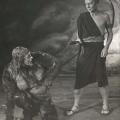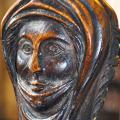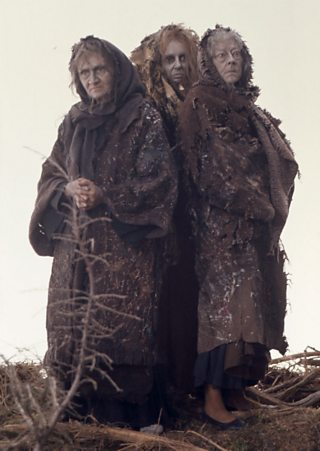428. Weird Sisters: Shakespeare’s Macbeth and Witchcraft
How Macbeth reflects the anxieties and explanations surrounding witchcraft and witch-hunting in early modern Europe.
Themes:
• P.C. Almond, England’s First Demonologist: Reginald Scot and ‘The Discoverie of Witchcraft’ (London: 2011).
• S. Clark, Thinking with Demons: The Idea of Witchcraft in Early Modern Europe (Oxford: 1999).
• P. Elmer, Witchcraft, Witch-Hunting, and Politics in Early Modern England (Oxford: 2016).
• S. Greenblatt, “Shakespeare Bewitched,” in J.N. Cox and L.J. Reynolds (eds.), New Historical Literary Study: Essays on Reproducing Texts, Representing History (Princeton: 1993), 108-35.
• B.P. Levack, The Oxford Handbook of Witchcraft in Early Modern Europe and Colonial America (Oxford: 2013).
• A. Macfarlane, Witchcraft in Tudor and Stuart England (London: 1970).
• C.-R. Millar, Witchcraft, the Devil, and Emotions in Early Modern England (London: 2017).
• J. Sharpe, Instruments of Darkness: Witchcraft in England 1550–1750 (London: 1996).
• K. Thomas, Religion and the Decline of Magic: Studies in Popular Beliefs in Sixteenth and Seventeenth Century England (London: 1971).
• L. Roper, Oedipus and the Devil: Witchcraft, Sexuality and Religon in Early Modern Europe (London: 1994).
• G. Wills, Witches and Jesuits: Shakespeare’s Macbeth (New York: 1995).







Comments
Episode
It was an excellent episode and a good bibliography. Euan Cameron's book "Enchanted Europe: Superstition, Reason, and Religion, 1250-1750" (Oxford, 2010) is also very interesting and might supplement what you have done. His is still the best book on the European Reformation.
Which philosopher will next recieve a mini series
Wonderful Professor, these 5 last episodes on Shakespeare were excellent, which philosopher do you plan on devoting 3+ episodes next, I presume Franicsco Suarez of the School of Salamanca ?
Once we reach 1600-1800 we'll start covering major figures in multiple episodes, like how you covered Ockham, Scotus, Aquinas extensively, I expect the same for Descartes (who might himself reach 10+ like how you covered Augustine, Plato and Aristotle).
In reply to Which philosopher will next recieve a mini series by dukeofethereal
Miniseries
Yes I think that's right - maybe not a series on just one person, but there will be a tightly grouped series on the Iberian scholastics. Coming up sooner we have a kind of mini-series on Renaissance British science, with Dee, Harriot, Gilbert etc in focus. I am increasingly finding that having thematically grouped episodes like this is helpful for me (and hopefully the audience) to tackle one biggish topic at a time.
Weird sisters
"But I fear that no weapon wrought along by man's hand would have any effect on him. I dared not wait to see him return, for I feared to see those weird sisters."
"Dracula" chapter 4
Scotland
I was a bit surprised Scotland didn't come up very much (at all?) in this episode. You've covered it for other parts of this series. As I understand it, while the vast majority of witch hunts happened in the HRE, the vast majority of those that occurred outside the HRE happened in Scotland or Denmark.
Am i mistaken on this? Was it just too unrelated to Shakespeare or to the other theorists covered?
In reply to Scotland by Alexander Johnson
Witches in Scotland
No you're right, I actually have some notes on that but they were purely historical and I didn't really find a way to shoehorn it in (though perhaps I could have done that when contrasting England to the Continent - I will actually do that for the book, thanks). Apparently there were about 4000 trials with five waves of panic, the first starting in 1590. There is also a book on the topic which at least made it into a note for the book version:
J. Goodare, L. Martin and J. Miller (eds), Witchcraft and Belief in Early Modern Scotland (Houndsmills: 2008).
Weird sisters greet MacBeth
I remember, more or less, what a high school teacher said many years ago (circa 1957). They greet Macbeth as:
Thane of Glamis---which he already knew.
Thane of Cawdor ---which had already happened, though he did not know it, yet
King thereafter --- had not happened yet, but which he could bring about himself.
They tell Banquo he will not be king, but will father kings--which has not happened yet.
Macbeth had no reason to believe the weird sisters could predict the future, since what he could verify had already happened. So it seems he and his wife wanted him to become king and used the weird sisters as an excuse. Then having killed King Duncan, they had to follow up with further killings.
Some think that some or all of the weird sisters scenes were later interpolations! But the later appearances of the weird sisters may have made some ambiguous predictions which Macbeth did not interpret correctly.
Silvia Frederici's Works on The matter
Thank you very much for the wonderful material.
Please: how come Silvia's Works ARE not mentioned in this... And apparently no other Episodes?
Best regards,
In reply to Silvia Frederici's Works on The matter by Augusto Luiz d…
Frederici
Oh good point, her work does look relevant. Mostly what I mention in the bibliographies is what I actually read for preparing the episodes - as you might imagine, I didn't read everything that has been published on Shakespeare that might be worth reading!
Add new comment